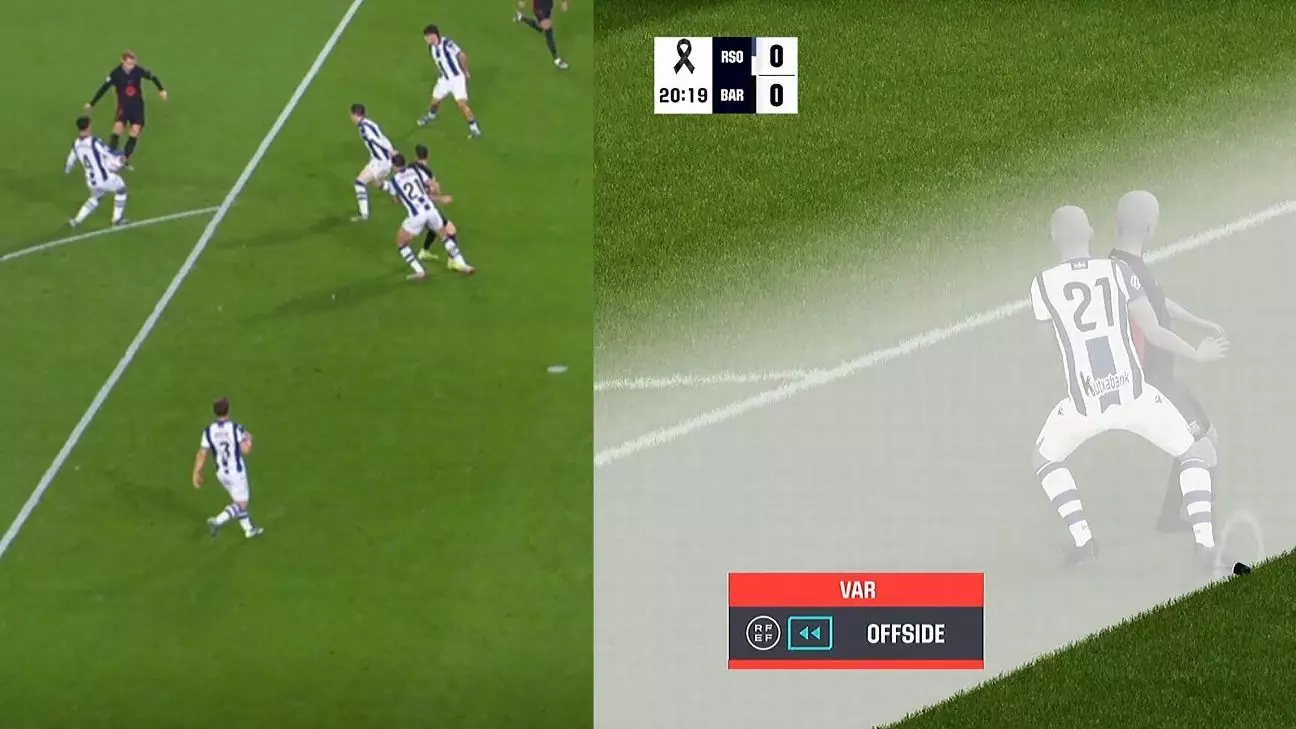In the ever-evolving landscape of football, technology has always played a crucial role in shaping the integrity of the game. The recent disallowance of Robert Lewandowski’s goal during Barcelona’s narrow defeat to Real Sociedad has reignited pivotal discussions surrounding the use of semi-automatic VAR (SAOT) technology. Barcelona’s sporting director, Deco, took the liberty to question the operational efficiency of this technology, calling for clarity and a comprehensive understanding of what constitutes “semi-automatic.”
During the 14th minute of play at Anoeta, Lewandowski found the back of the net, a moment of sheer ecstasy for Barcelona fans that swiftly turned to dismay when the goal was disallowed. According to the semi-automatic VAR system, Lewandowski’s toe was marginally offside. This pivotal moment not only resulted in a 1-0 defeat for Barcelona but also triggered substantial scrutiny regarding the decision-making process behind the scenes. Hansi Flick, Barcelona’s head coach, described the disallowed goal as a “huge mistake,” a sentiment echoed by supporters and analysts alike.
The essence of the controversy lies in the technology that was employed to make such a definitive call. It is evident that there are still hurdles to overcome with the implementation of SAOT, particularly regarding its perceived accuracy. The frustration felt by Deco and the Barcelona camp is entirely warranted; if VAR technology is supposed to enhance fairness in football, its mechanisms must be clearly understood and effectively applied.
Deco articulated the confusion surrounding the SAOT technology, expressing a need for a clearer explanation of its functioning. His comment, “Why is it semi-automatic?” highlights a significant concern—how can a system designed to assist referees operate if its foundations remain ambiguous? The stark comparison made by Deco, likening the system to an unsure transition between an automatic and hybrid vehicle, underscores a larger problem within the footballing framework.
Deco’s frustration is not solely confined to Barcelona; it reflects a wider sentiment across the league where clubs desire uniformity and precision in officiating decisions. He stated that the mystery surrounding the implementation of VAR could lead to inconsistencies not just for Barcelona, but for all teams involved in La Liga. If the technology cannot provide reliable outcomes, a re-evaluation of its usage becomes imperative.
The semi-automatic VAR system was intended to enhance decision-making by giving referees and officials a greater arsenal of data to rely upon. Utilizing 12 dedicated tracking cameras, the system captures up to 29 data points related to each player’s position on the field, providing a meticulous analysis at a rate of 50 times per second. Theoretically, this should offer an unparalleled advantage in determining offside calls. Yet, the real question emerges: If the technology is so advanced, why do discrepancies still arise, leading to contentious decisions as witnessed in the match against Real Sociedad?
While the Refereeing Committee in Spain may uphold the legitimacy of the decision made on the day, questions linger regarding the fundamental reliability of the technology. Barcelona’s claim that SAOT failed during this critical moment has serious implications for its future use, emphasizing that the quality of technology must match its intent.
Beyond the technology debate lies another layer of concern regarding team dynamics and player contributions. The absence of young sensation Lamine Yamal during the match against Real Sociedad was felt palpably as Barcelona faced their second loss of the season. Deco’s remarks, emphasizing comparisons between Yamal and the legendary Lionel Messi, suggest that he recognizes the weight on the young player’s shoulders. Yamal represents a new wave of talent, one that adds depth to an evolving Barcelona squad.
However, comparisons with Messi, or any player of his stature, can create undue pressure on developing talents like Yamal. Football is steeped in emotion and nostalgia, making it natural for fans and pundits to draw parallels. Yet, it is crucial to acknowledge Yamal’s unique journey within a differing context. As Barcelona embarks on a reconstruction phase, nurturing talents without undue comparisons will be essential for both individual and collective success.
Deco’s admission of confusion regarding the SAOT system speaks to a broader issue of transparency and operational clarity in football technology. The integrity of the sport relies on effective systems, and any clouded uncertainties can undermine the goals of fairness and accuracy that VAR seeks to achieve. Furthermore, as Barcelona continues to navigate through these challenges, the emergence of young players like Lamine Yamal signifies a hopeful future intertwined with the club’s storied legacy. For football to evolve in a constructive manner, cooperation between clubs, technology developers, and governing bodies will be pivotal in ensuring the game remains as fair and exciting as possible.

